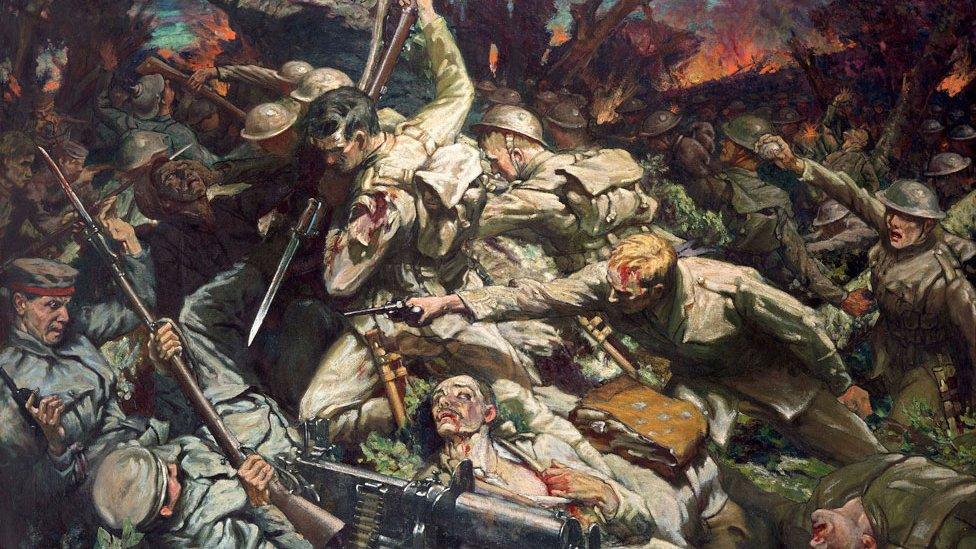Gareth Thomas visits Mametz Wood in steps of ancestors
- Published
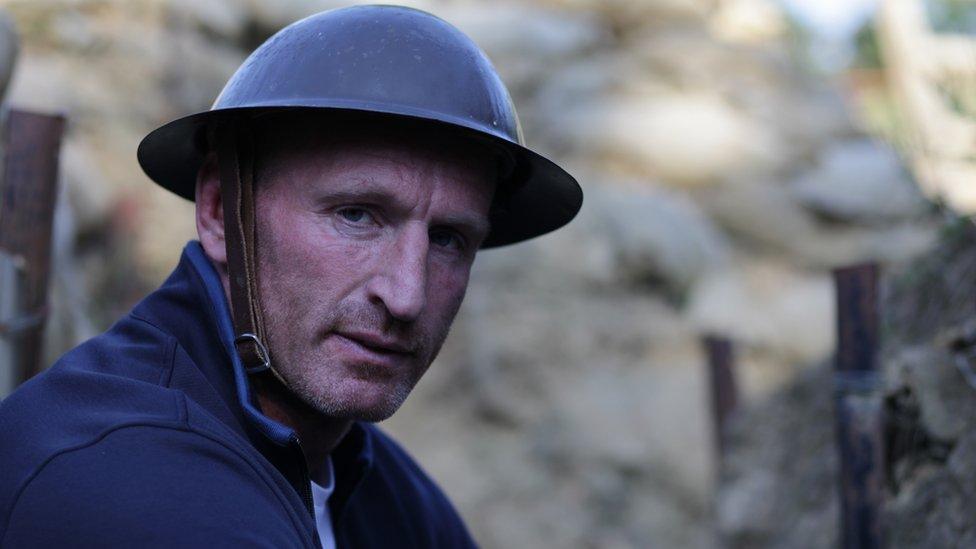
Gareth Thomas visited Mametz Wood to see the battleground where hundreds of soldiers died
Former rugby player Gareth Thomas has retraced the steps of his ancestors from the Valleys to Mametz Wood.
Thomas visited the site of the battlefield in France where hundreds of Welsh soldiers died in World War One.
Two of his great uncles were among those who died fighting against the German army in the Somme.
The former Wales captain followed in their footsteps with his parents to find out exactly what happened to them.
"I wanted to learn more about my uncles because I feel it is a duty," he said.
"I feel anybody who has a history and a connection with people who gave their lives for the way we live our lives now, it's only right that you should find out what these people went through."
Mametz Wood was of key strategic importance in the Battle of the Somme - a conflict between the Allied forces and the Germans which took place on a 15-mile (24km) front for five months.
The 38th Welsh Division launched an assault on the woods from 7 July, finally forcing the Germans to retreat after four days.
The 21st Division finally cleared the forest of the remaining enemy soldiers on 12 July, although they recaptured Mametz Wood within weeks and held it for the remainder of the war.
Thomas's great uncles Edward, 20, and William, 24, both died serving in the Somme, although their family had no idea what happened to them.
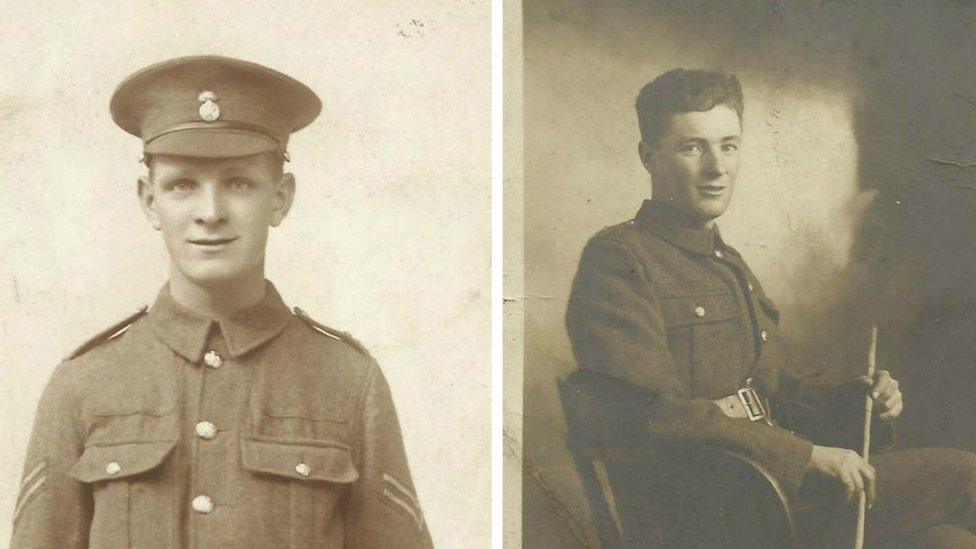
All the family had left to remember Edward and William Thomas was a photo of each of them in their uniforms
They were among 1,500 soldiers from the valleys who served in World War One who never made it back.
Welsh soldiers were sent to France with very little experience and some were forced to use brooms rather than rifles in training.
Thomas said: "I'm extremely proud of the fact that they went to battle and gave their lives for our country. So for me, I don't want them to be forgotten, ever."
His family now know Edward Thomas, of 10th Battalion, Royal Welsh Fusiliers, died on 16 August 1916 while taking part in a night attack in the area just east of Mametz.
The unit crept up on the German trenches and were within 14 metres (46ft) of it when the British artillery opened fire and mistakenly hit their own men in No Man's Land, rather than the trenches.
"It doesn't shock me because I have heard other stories which seem to be the same," said Thomas.
"There is some kind of confusion and the communication is the thing that was the let down in the First World War."
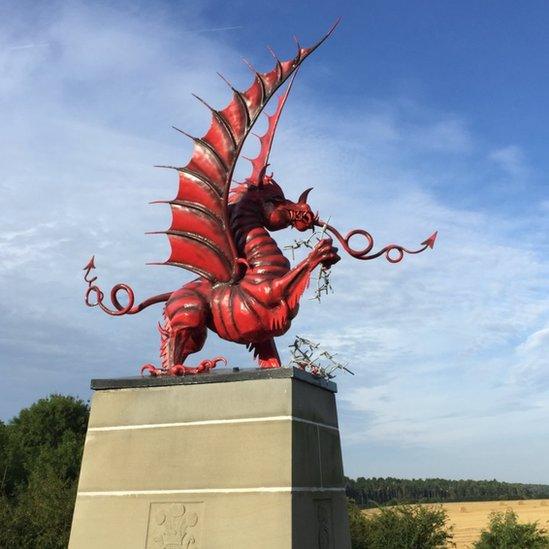
The memorial to Welsh soldiers who gave their lives at Mametz Wood
William Thomas was killed by German shells on 3 July 1916 while he repaired the road between the village of Aveluy and the British front line days before the Mametz Wood battle.
Among the 120,000 soldiers from Wales who fought in the war, about 40,000 died.
Thomas said: "Sometimes you think you do things in life that can't make you any more proud, and I thought playing for Wales was for me the ultimate thing, but I think finding out this story, not just of William and Edward, but the story of everybody is definitely a moment that matches any pride I had when I wore a Welsh rugby jersey."
The former Cardiff Blues player also joined the first major archaeological dig at Mametz Wood since the battle.
The trenches were back-filled after the cease fire, but historians hoped to uncover fresh evidence about the battleground.
With the help of laser mapping technology, they discovered what they believed to be a deep wartime trench system in the wood used by the Germans as a command centre.
Battlefield historian Steve Roberts said: "It appears to be a complete trench system, all interlinked, with depressions where there are possibly dug outs you have probably got a major command centre.
"I can't think of seeing anything else on this scale in a wood."
The archaeologists think this could be part of the reason the Welsh soldiers found it so hard to penetrate the wood in a battle that took five days, rather than the few hours predicted at the outset.
"There were accusations that the men had a lack of determination and a lack of resolve," said Mr Roberts.
"In effect they were calling them cowards. They were saying that these guys were not up to the job, they didn't press hard enough, they didn't push hard enough.
"The term a 'lack of determination' was used by General Haigh who was in charge of the Army.
"These guys did the absolute best on the day, they worked to the absolute best of their ability. No unit would have been able to do it."
Wales at the Somme, 4 July, BBC One Wales, 21:00BST
- Published5 May 2016
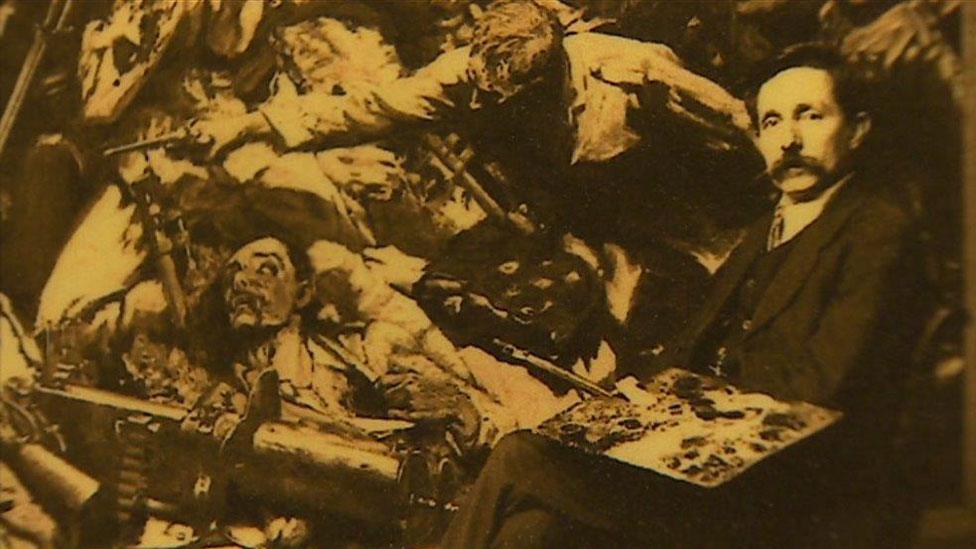
- Published21 May 2016
